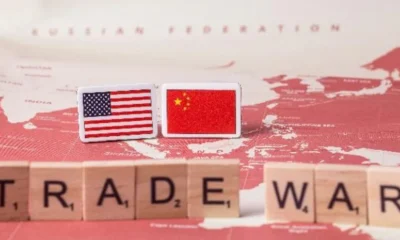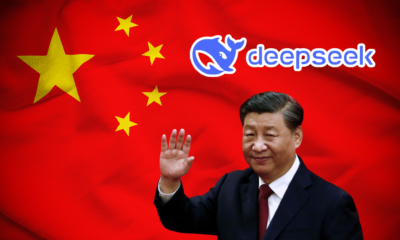Opinion
Is International Law Losing Its Grip? The Alarming Rise of Conquest Politics, Is It A Race To Acquire Critical Resources?
Is international law failing us?
Is international law failing us?
Published
1 year agoon

In a world that prides itself on the principles of sovereignty and self-determination, the recent trend of outright territorial ambitions by powerful nations raises a troubling question – is international law failing us?
From China’s unrelenting claims over Taiwan to Russia’s invasion of Ukraine, and from the horrors of Israel’s strikes in Gaza to the U.S.’s audacious musings over Greenland, it feels as though the world is slipping back into an era where might makes right.
The principles enshrined in the United Nations Charter—peaceful coexistence, respect for sovereignty, and self-determination—seem to be paper shields against the ambitions of modern empires.
The failure lies not in the laws themselves but in their enforcement. The world’s most powerful nations often escape accountability, using their influence to sidestep consequences. This double standard erodes trust and emboldens aggression.
When Sovereignty Becomes Negotiable
Russia-Ukraine: The war, now dragging into years, has devastated millions of lives. Russia’s justification? Historic ties and “security concerns.” But where does that leave Ukraine’s right to self-determination?
China-Taiwan: China’s rhetoric about “reunification” has grown increasingly aggressive, with military exercises and political intimidation making Taiwan’s sovereignty precarious.
Israel-Gaza: A conflict deeply rooted in history, yet exacerbated by modern-day military might, displacing civilians and igniting debates about humanity’s moral compass.
U.S.-Greenland, Panama, and Canada: The U.S.’s open discussion about acquiring Greenland—an autonomous territory—and strategic interests in other regions signal a shift toward imperialistic undertones under the guise of national security.
Where Are The Winds Blowing?
These territorial disputes and conquests evoke memories of the Cold War—a time when global superpowers carved the world into spheres of influence, with little regard for smaller nations’ autonomy. The fear now is that this is not just a cold war; it’s a prelude to something hotter, deadlier, and more destructive.

Might Over Humanity. The Harsh Reality
International law, which once offered hope, is increasingly viewed as a tool for the powerful. Resolutions are vetoed, treaties are violated, and global organizations remain toothless in the face of blatant aggression.
What’s more disheartening is the normalization of conquest politics. The language of diplomacy is being replaced with ultimatums, and the promise of peace with threats of war.
A Race for Resources?
Beyond power plays and territorial ambitions, there lies a darker truth—the world is running out of easily accessible resources. As human greed has depleted traditional reserves, the focus has shifted to untapped regions.
Greenland is a prime example. Beneath its icy surface lie vast reserves of rare earth minerals critical for modern technology. As the Arctic ice melts, these resources become more accessible, making Greenland a geopolitical hotspot.
Ukraine’s fertile lands and energy resources have long been a point of contention. Russia’s actions are as much about control over these assets as they are about geopolitics.
Taiwan is not just a symbol of sovereignty; it is the hub of global semiconductor production. Controlling Taiwan would mean controlling the tech industry’s beating heart.
As technology advances, the hunt for critical resources intensifies. Lithium, cobalt, and rare earth elements—the building blocks of renewable energy and modern devices—are concentrated in regions yet to be fully exploited. The Arctic, Africa, and the deep sea are becoming battlegrounds for nations vying for dominance.
A Cold War Redux or Something Worse?
The current trajectory evokes memories of the Cold War, a time when superpowers divided the world into spheres of influence. But today’s reality is even more precarious. Unlike the ideological battles of the 20th century, today’s conflicts are driven by tangible, finite resources. The bets are higher, and the consequences more immediate.
Are we headed for perpetual conflict? Or worse, a hot war fueled by competition over resources?
As nations prioritize their own interests over global stability, the risks of escalation grow. Innocent lives are lost, and humanity’s moral compass falters under the weight of ambition.
The international community must act decisively to prevent further erosion of peace and order. Strengthen international institutions, reform organizations like the United Nations need to ensure accountability, even for powerful nations.
There is also a need to enforce resource sharing agreements and create and enforce treaties that regulate the exploitation of critical resources, ensuring equitable access.
Likewise, prioritize diplomacy over militarization and most importantly invest in sustainable alternatives and reduce dependency on finite resources by accelerating the development of sustainable technologies.
At its core, the rise of conquest politics is a test of humanity’s values. Will we succumb to the age-old instinct of domination, or will we embrace cooperation and mutual respect? The answer will define not just the future of international law but the very survival of our species.
The world stands at a juncture where one path leads to cooperation and progress and the other to conflict and chaos. Which will we choose?


Taiwan’s ‘Historic’ TSMC Deal, A Win Or The End Of Its ‘Silicon Shield’ As China Threatens? A Jittery Taiwan Watches Trump’s Moves On Ukraine, Wondering, Could We Be Next?


A Trade War That Just Won’t Quit. As Trump’s Tariffs Hit, China Stays The Course, For Xi’s Its Business As Usual Strategy


Indian Stock Market In Turmoil. Investors In Panic Mode, Is This A Temporary Correction Or The Start Of A Bear Market?


America And China’s Thirst For Gold In 2025 Is Draining Other Countries’ Reserves; Here’s Why?


Shakeup In The Auto Sector. Mercedes-Benz 15% Job Cuts, Nissan CEO Exit, And Germany’s Make-Or-Break Year


DeepSeek Ai Rush. China’s AI Contender Gears Up for Next Big Launch Even As It Gets Xi Jinping’s Blessings
